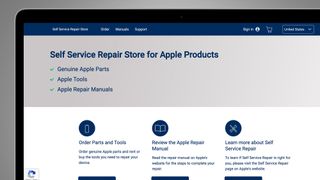Apple’s self-repair service now includes these new iPhones and MacBooks
If you’ve managed to break your new iPhone 14, MacBook, or MacBook Pro recently and would rather not send it off for repair, Apple has some good news – it’s expanding its Self Service Repair to include some of the latest models in those ranges.
From June 21, you’ll be able to get the same genuine Apple parts, tools, and manuals used by Apple’s authorized stores to help you fix any model in the iPhone 14 and 14 Pro lineup, plus the Apple MacBook Air (M2, 2022) and Apple MacBook Pro 14-inch (2023). It’s also now possible to self-repair the TrueDepth camera and top speaker for the iPhone 12 and iPhone 13.
Each of these Apple products will have a list of “orderable parts”, which you can find by looking at the relevant repair manual in Apple’s online support section. These tell you which parts are available for self-repair – it’s then a case of ordering the right parts from the Self Service Repair Store and following the instructions.
Fortunately, Apple has also streamlined the final part of its self-repair process. Previously, you had to contact the Self Service Repair Store to start what’s called a ‘System Configuration’ for some repairs, like ones relating to displays, batteries, and cameras. This software checks to make sure you completed the repairs correctly and that everything is working properly.
But Apple says you can now do this yourself, without having to contact the store. Instead, you can now start System Configuration by putting your device into Diagnostics mode and following the onscreen instructions.
That said, Apple doesn’t recommend its Self Service Repair for most people. It says that “for the vast majority of users who do not have experience repairing electronic devices, visiting a professional authorized repair provider with certified technicians who use genuine Apple parts is the safest and most reliable way to get a repair”. In other words, tinker at your own risk.
Handle with care
Apple’s Self Service Repair expansion comes just a day after Samsung announced that its equivalent service is coming to the UK and Europe, to help rescue Galaxy phones and Galaxy Books.
But while they’re a positive development for the planet and for those who like to tinker with electronics, these services remain relatively niche offerings thanks to their drawbacks.
First, not all components can be self-repaired and, in Apple’s case, you have to rent a repair kit that then has to be returned to Apple. Depending on what you’re trying to fix, the repairs can also be complex, time-consuming, and not always cheaper than simply taking your busted phone or laptop to an authorized repair store.
Also, if you’re covered by the likes of AppleCare Plus or Samsung Care Plus, then these self-repair services are largely irrelevant, as it’ll be far cheaper to use your protection plan instead.
Still, until Apple makes an equivalent of the modular Fairphone 4, this is the closest thing we’ll get to repairing our own iPhones – and that’s now possible on several generations, from the iPhone 12 to the iPhone 14.

